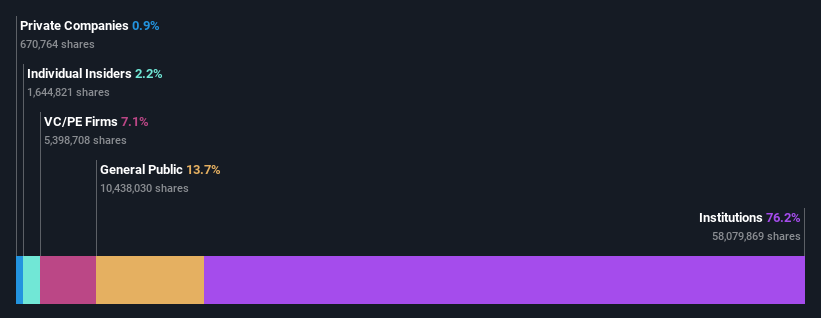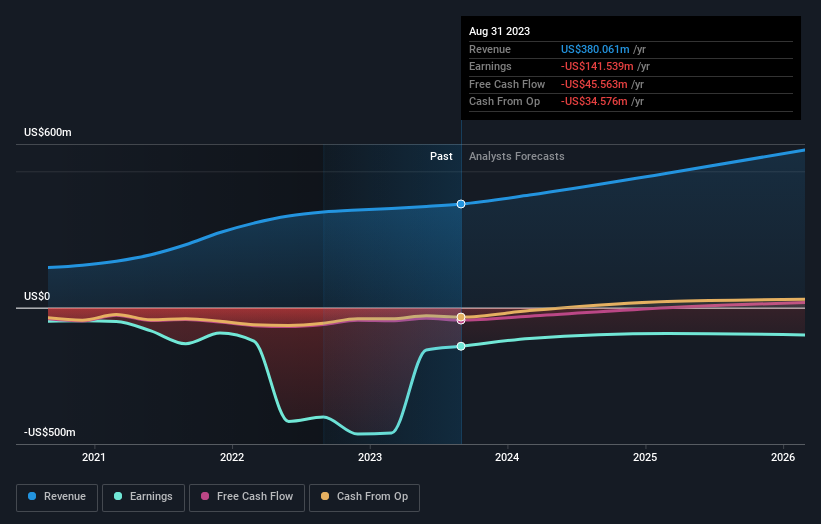Please use a PC Browser to access Register-Tadawul
With 76% ownership in Accolade, Inc. (NASDAQ:ACCD), institutional investors have a lot riding on the business
Accolade ACCD | 0.00 |
Key Insights
- Institutions' substantial holdings in Accolade implies that they have significant influence over the company's share price
- 51% of the business is held by the top 7 shareholders
- Recent sales by insiders
To get a sense of who is truly in control of Accolade, Inc. (NASDAQ:ACCD), it is important to understand the ownership structure of the business. And the group that holds the biggest piece of the pie are institutions with 76% ownership. That is, the group stands to benefit the most if the stock rises (or lose the most if there is a downturn).
And as as result, institutional investors reaped the most rewards after the company's stock price gained 12% last week. The one-year return on investment is currently 40% and last week's gain would have been more than welcomed.
Let's delve deeper into each type of owner of Accolade, beginning with the chart below.
Check out our latest analysis for Accolade

What Does The Institutional Ownership Tell Us About Accolade?
Institutional investors commonly compare their own returns to the returns of a commonly followed index. So they generally do consider buying larger companies that are included in the relevant benchmark index.
As you can see, institutional investors have a fair amount of stake in Accolade. This implies the analysts working for those institutions have looked at the stock and they like it. But just like anyone else, they could be wrong. If multiple institutions change their view on a stock at the same time, you could see the share price drop fast. It's therefore worth looking at Accolade's earnings history below. Of course, the future is what really matters.

Institutional investors own over 50% of the company, so together than can probably strongly influence board decisions. We note that hedge funds don't have a meaningful investment in Accolade. Our data shows that JP Morgan Asset Management is the largest shareholder with 8.2% of shares outstanding. The second and third largest shareholders are Brown Advisory Incorporated and ARK Investment Management LLC, with an equal amount of shares to their name at 8.0%. Furthermore, CEO Rajeev Singh is the owner of 1.0% of the company's shares.
We did some more digging and found that 7 of the top shareholders account for roughly 51% of the register, implying that along with larger shareholders, there are a few smaller shareholders, thereby balancing out each others interests somewhat.
While studying institutional ownership for a company can add value to your research, it is also a good practice to research analyst recommendations to get a deeper understand of a stock's expected performance. Quite a few analysts cover the stock, so you could look into forecast growth quite easily.
Insider Ownership Of Accolade
The definition of an insider can differ slightly between different countries, but members of the board of directors always count. Company management run the business, but the CEO will answer to the board, even if he or she is a member of it.
Insider ownership is positive when it signals leadership are thinking like the true owners of the company. However, high insider ownership can also give immense power to a small group within the company. This can be negative in some circumstances.
Shareholders would probably be interested to learn that insiders own shares in Accolade, Inc.. In their own names, insiders own US$19m worth of stock in the US$891m company. This shows at least some alignment. You can click here to see if those insiders have been buying or selling.
General Public Ownership
The general public, who are usually individual investors, hold a 14% stake in Accolade. While this size of ownership may not be enough to sway a policy decision in their favour, they can still make a collective impact on company policies.
Private Equity Ownership
With a stake of 7.1%, private equity firms could influence the Accolade board. Some might like this, because private equity are sometimes activists who hold management accountable. But other times, private equity is selling out, having taking the company public.
Next Steps:
I find it very interesting to look at who exactly owns a company. But to truly gain insight, we need to consider other information, too. For example, we've discovered 2 warning signs for Accolade that you should be aware of before investing here.
Ultimately the future is most important. You can access this free report on analyst forecasts for the company.
NB: Figures in this article are calculated using data from the last twelve months, which refer to the 12-month period ending on the last date of the month the financial statement is dated. This may not be consistent with full year annual report figures.
This article by Simply Wall St is general in nature. We provide commentary based on historical data and analyst forecasts only using an unbiased methodology and our articles are not intended to be financial advice. It does not constitute a recommendation to buy or sell any stock, and does not take account of your objectives, or your financial situation. We aim to bring you long-term focused analysis driven by fundamental data. Note that our analysis may not factor in the latest price-sensitive company announcements or qualitative material. Simply Wall St has no position in any stocks mentioned.



